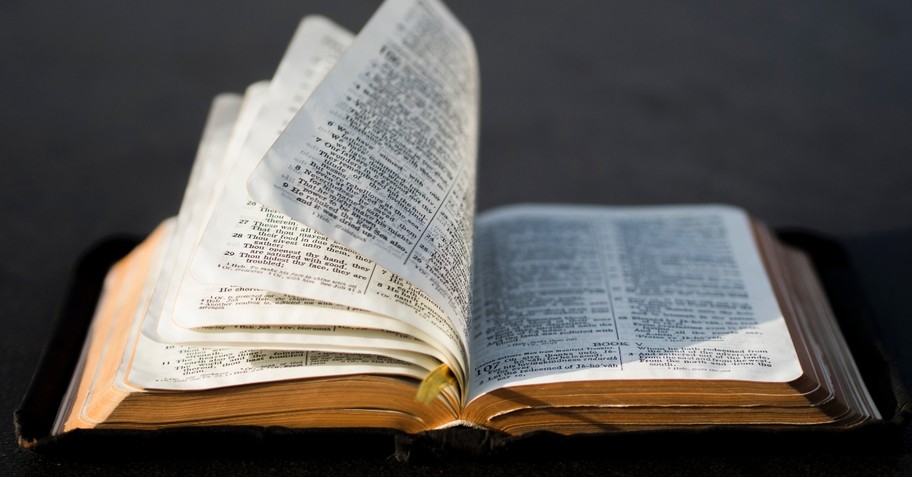The Biblical Canon: How was the Bible Canon Chosen?

Knowing the canonical story of the Holy Bible helps us defend the Faith, and as the Lord opens hearts, it supports the growth of the Kingdom of God. The Christian faith is not about a feeling, a religious duty, or a philosophy of life. Christianity is about Jesus Christ, who is revealed as the Eternal Word in the flesh and revealed in the supernatural Word written for our salvation. It is in this sense that one approaches the Canon of Scripture.
The Canon of Scripture is a doctrine of divine origin. The Bible is as miraculous as the creation of the heavens and the earth, an iron ax-head floating on top of the water, the dead man Lazarus walking forth in his burial winding sheet, the Virgin birth, or the resurrection of our God and Savior, Jesus Christ. This is how we must approach this critical subject.
In the beginning was the Word, and the Word was with God, and the Word was God. He was at the beginning with God. All things were made through him, and without him was not any thing made that was made. In him was life, and the life was the light of men. The light shines in the darkness, and the darkness has not overcome it. (John 1:1-4)
And the Word became flesh and dwelt among us, and we have seen his glory, glory as of the only Son from the Father, full of grace and truth. (John 1:14).
All Scripture is breathed out by God and profitable for teaching, for reproof, for correction, and for training in righteousness (2 Timothy 3:16)
Here is the meaning of the Bible Canon and its history to help us know the story of God's providence.
Photo Credit: ©GettyImages/RomoloTavani
What is the Bible Canon?
The term "Bible Canon" refers to the collection of books that are considered authoritative and sacred within a particular religious tradition. The word "canon" comes from the Greek word "kanon," meaning a rule or standard. The Bible Canon varies among religious groups, but the term is most commonly associated with the Christian Bible.
The Christian Bible is divided into two main sections: the Old and New Testaments. The Old Testament contains religious texts that are also part of the Hebrew Bible, sacred in Judaism. The New Testament contains texts that are specific to Christianity.
Different Christian denominations may have variations in their Old Testament canons. For example, the Catholic Old Testament includes books not found in the Hebrew Bible or most Protestant Old Testaments. These additional books are referred to as the Deuterocanonical books.
The New Testament is more universally accepted among Christian denominations, although there were historical debates about certain books before a consensus was reached. The process of determining the canon varied over time and across different regions, with factors such as apostolic authorship, widespread use in worship, and theological consistency playing roles in the inclusion of books in the Bible Canon.
The Bible Canon was/is Debated
There are undoubtedly some who are reading these words who might be tempted to believe the study of Canon is dull. Perhaps you think of the canonization of the Bible as something only academics chat about in dark, book-lined libraries. Maybe you believe it is of little value to your life as a believer. Well, if that is you, I want to say: draw closer. Canonicity represents the activity of God in the Church in giving us his Word, recording that Word, and distributing the Word to the ends of the earth through the power of the Holy Spirit. There has never been a time when we in the evangelical churches needed a higher view of Scripture. Yet, we all recognize that we are living in a dry land:
"Because God has made himself known in his Word, a commitment to a high view of Scripture is of paramount importance. Yet, sadly, more and more people—not only from outside the Church but also from within—are denying the complete truthfulness of God's Word" (Sproul).
The Bible Canon Defined
The Canon of the Old Testament was set by the time of Jesus. Jesus recognized the canonicity of the Old Testament, that is, the very collection of books that you have in your Bible today. The doctrine of Christ will naturally and effortlessly cause the believer to develop a high view of Scripture. Infallible and inerrant are just so because Jesus believed it. Please make no mistake: Jesus is our ultimate source of knowledge about the canonization of the Bible. No one can deny that the New Testament is replete with examples of Jesus and the apostles referring to the Old Testament books as the very Word of God.
In a similar self-attesting way, the New Testament speaks of itself and ends on par with the Old Testament Scriptures. By the time of the early Church, the authentic epistles and histories (viz., the Gospels, Epistles, and Acts) written by the Apostles and aids were used and received as the Word of God. This is because we must not suppose that the early Church received these as divine by Man but only by the power of the Holy Spirit. We shall address this further as we move forward. This leads me to attend to some essential foundation stones of the canonicity of Holy Scripture before erecting any further points of doctrine.
So, before we go any further, let us make sure we discuss the same thing. Let us begin with definitions.

The Meaning of "Canon"
Our English Word, "Canon," is derived from a Hebrew and Greek word denoting a reed or a cane. So we would call it a "ruler," like the old wooden ruler you had in your supplies for third grade. Canon, then, grew out of a word that means something straight, or something to keep straight, a standard of truth. In this way of thinking, the Canon of Scripture refers to measuring the God-breathed truths revealed to men.
A Defense for the Canon of Holy Scripture
So, the word "canon" is the accurate measurement of a thing against the model in the most general meaning. In the case of Holy Scripture, the written Word of God must equate to the Holy Spirit-inspired ("God-breathed") Word of God. This is the meaning of 2 Timothy 3:16:
All Scripture is given by inspiration of God, and is profitable for doctrine, for reproof, for correction, for instruction in righteousness, that the man of God may be complete, thoroughly equipped for every good work (NKJV).
Thus, the Word of God is Inscripturated by God, as the Reverend Jonathan Witherspoon put it. The imminent Presbyterian minister, scholar, public theologian, Princeton president, and only clergyman to sign the Declaration of Independence gave us solid and valuable work. The eternal Word of God became flesh and became—for us, and our salvation—the Word made accessible. Israel was prohibited from seeking to know God by making images. Instead, we were to think thoughts after God. The People of Israel were to meditate upon God through his Word, which he gave them. Abundant life and eternal life came not from manufactured religious attempts for atonement but rather through the Word of God read, taught, preached, song, and shared with others, beginning with our own families. This is quite different from learning the Gospel by stained glass windows only. Instead, those sixty-six books of the Old and New Testament are measured by an inerrant and infallible standard, the very Word of God. So, we may say, the Canon of Holy Scripture is the divinely authorized collection of writings—no more and no less—than are indeed God's Word revealed to humankind for God's gracious purposes, through the supernatural agency of the Holy Spirit.
Now. How did Canon come to be?
Photo Credit: © Unsplash/Aaron Burden
How Was the Bible Canon Decided?
The process of determining the canon of the Bible was complex and varied across different religious traditions. The canonization of the Bible took place over several centuries and involved factors such as authority, usage in worship, apostolicity, and theological consistency. Here is a general overview of how the Bible canon was decided, particularly in the context of the Christian Bible:
Oral Tradition and Early Writings: In the early Christian community, oral traditions about the teachings and actions of Jesus were passed down. Early Christian writings, including letters and Gospels, were also circulated among the believers. The authenticity and authority of these writings were crucial factors.
Apostolic Authority: Early Christians valued writings that were believed to have been authored by the apostles or those closely associated with them. A connection to the apostles was seen as a mark of authority.
Usage in Worship: Texts widely used in Christian worship and read in liturgical settings were often considered authoritative. This widespread use helped to establish the canonical status of certain writings.
Theological Consistency: The compatibility of a text with the theological beliefs and teachings of the early Christian community played a role in its acceptance into the canon. Consistency with established doctrine and the overall message of the faith was important.
Councils and Synods: Church councils and synods played a significant role in formalizing the canon. The decisions of these gatherings helped to settle disputes and establish a consensus on which books were considered part of the authoritative Scriptures. The Councils of Hippo (393 AD) and Carthage (397 AD) are often cited in the context of the Christian Bible.
Recognition by Church Fathers: Early Christian leaders and theologians, known as the Church Fathers, played a role in recognizing and endorsing certain writings. Their influence and consensus contributed to the acceptance of particular books.
Tradition and Guiding of the Holy Spirit: The belief in the guidance of the Holy Spirit was fundamental to the process of canonization. The idea was that the Holy Spirit guided the Christian community in recognizing which texts were divinely inspired and should be included in the canon.
Is the Canon of Scripture a Product of the Community?
In this view, held by many Roman Catholic believers and some in Protestant denominations, the Canon of Scripture is set not by one gathering of church leaders on a specific date but is authorized by its usefulness and acceptance in the churches. Here is a description of the view by a Roman Catholic source, set forth, in my opinion, in the most gracious way, allowing room for both sides of the argument:
The Early Church Fathers understood the Canon of Scripture was set by God. They also knew that God communicated this fact through the Catholic Church. Many of them lived during the period when this was done. There was no consensus, as some seem to think. Eusebius tells us that the book of 1 Clement was read in the churches from the early days until his own time (Church History 3:16 [A.D. 325]).
This via media view has much to commend. However, this explanation stops short of affirming the miracle of the Canon of Scripture.

Did God Inspire the Bible Canon?
Yes. The canonization of both the Old and New Testament developed through time, in localities, by mortal writers, yet all by the supernatural work of the Holy Spirit. The Bible was and is received as the Word of God because it is the Word of God. This is the message of those (I am among them) who confess Scripture because we believe that the Holy Spirit in a believer (or the Spirit working upon the heart of an unbeliever) recognizes Himself in His Word. There is a supernatural connection that is not a nebulous "burden in the bosom" of Latter-Day Saints, but, relatively, a Spiritual power from on high that converts, convinces, condemns, corrects, and, in all ways, glorifies Jesus Christ as the Word of God. No Reformed confessional document teaches the miracle of the sixty-six books of the Holy Bible any better than the Westminster Confession of Faith (1646). The following is from the Westminster Confession of Faith (1646), 1:IV:
IV. The authority of the Holy Scripture, for which it ought to be believed and obeyed, dependeth not upon the testimony of any man or Church, but wholly upon God, (who is truth itself,) the author thereof: and therefore, it is to be received, because it is the Word of God.
Some have argued that this is circuitous reasoning and, therefore, a logical fallacy. Others have called it biblicism. The charges would be credible but for one immovable and incontestable reason: The Person of Jesus Christ. If Christ Jesus is the resurrected, ascended, and reigning Lord of Lords and King of Kings, then the origin, Canon, and purposes of Holy Scripture are altogether divine: "And beginning with Moses and all the Prophets, he interpreted to them in all the Scriptures the things concerning himself" (Luke 24:27 ESV).
The believing community did not select the books of the Bible for their purposes. God brought forth the books of the Bible for His intentions.
Photo Credit: ©Unsplash/Ben White
The Canon Defended
The canonization of the Bible does not need me or any other to defend its divine nature. The heavenly essence of Holy Scripture is its citadel.
The Bible was God’s Word before the beginning of the World. The Logos, our Lord Jesus Christ, is the Word of God personified. His presence and teaching are the fullness of that Word. Yet, the Word came to be recorded. God desired that humanity have a special revelation from heaven and gave us the Bible. We must remember that the Word of God was already the Word of God before the Old Testament prophet heard it and preached it. There is no human agency to either commission words as the Word of God or take words away.
Conclusion
The Canon of Scripture is the divinely authorized collection of sacred text—though debated— is defined, decided, and defended by the One who breathed forth its power., assembled, and completed for God's mission in the World.
The Westminster Confession of Faith (1.6) says, “The whole counsel of God concerning all things necessary for His glory, man’s salvation, faith, and life, is either expressly set down in Scripture, or by good and necessary consequence may be deduced from Scripture: unto which nothing at any time is to be added, whether by new revelations of the Spirit, or traditions of men."
Perhaps there is no greater self-validation of the Word of God than Hebrews 4:12: “For the Word of God is living and powerful, and sharper than any two-edged sword, piercing even to the division of soul and spirit, and joints and marrow, and is a discerner of the thoughts and intents of the heart" (NKJV).
This leaves us with one final Word on the Canon of Scripture: What is the place of the Word of God in your life? For some, it is dull. But, for those who have received Jesus Christ as Lord, the Canon of Scripture is nothing short of dazzling.
Originally published February 27, 2024.








